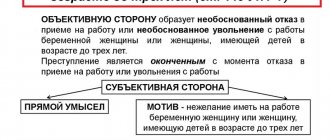Incorrect familiarization of the future employee with local regulations
In accordance with Part 3 of Article 68 of the Labor Code, the employee must be familiarized with the internal regulations of employers before he signs an employment contract . However, in practice, everything usually happens the other way around.
At the same time, liability for this violation is established under Part 1 of Article 5.27 of the Code of Administrative Offences. The fine for officials and individual entrepreneurs will be 1-5 thousand rubles , for legal entities - 30-50 thousand rubles.
It should be
Before signing an agreement with the employer, the employee must be familiarized with local regulations against signature. There are the following methods for this:
- The employee gets acquainted with the acts and puts his signature in a special familiarization journal or on a familiarization sheet.
- The employee puts his signature under the text of each LNA . In this case, it will be clear which text he has read.
- The text of the familiarization sheet is included in the employment contract .
In practice, all these methods are used, but the latter is not without its flaws. After all, the law requires that a person first familiarize himself with internal regulations, and only then sign an employment contract.
Why is it important? In the event of disputes, the courts will necessarily establish the fact that the employee has familiarized himself with local acts. For example, an employee violated discipline. However, he can only be held accountable if he was familiar with the LNA. If the employer does not prove this, the employee will avoid liability.
What to do
Check whether you have accepted the mandatory LNA for all employers :
- internal labor regulations;
- local acts on remuneration, personal data protection, labor protection.
Make sure that when hiring employees, they first sign on the familiarization sheet, in the familiarization log, or directly under the local act. And only after that they sign an employment contract.
General provisions
According to the law, both citizens and officials, individual entrepreneurs and legal entities can be held administratively liable.
Depending on the status of the culprit, the consequences of violating the law vary, from administrative fines to disqualification of an official.
For example, for improper execution of an employment contract, there is a fine in the amount of:
- from 10,000 to 20,000 rubles (per official);
- from 5,000 to 10,000 rubles (for individual entrepreneurs);
- from 50,000 to 100,000 rubles (for a legal entity).
Moreover, no one prohibits imposing a fine on an official and a legal entity simultaneously.
What is an official under the Administrative Code?
Absence of a place of work in the contract
Do you know what a place of work ? Part 2 of Article 57 of the Labor Code of the Russian Federation requires the presence of such a condition in the employment contract. But what is meant by it is not explained in the Code. Only the following is indicated: if the organization has branches at other addresses, and the employee will work in one of them, then a specific unit and its address are indicated as the place of work. What if there is no division?
Despite the consonance, the place of work is not identical to the workplace . This follows from the interpretation of Part 4 of Article 57 and Article 209 of the Labor Code of the Russian Federation. In accordance with the latest standard, the workplace is the place where the employee must be while carrying out his work under the supervision of the employer.
Many people believe that the place of work is the name of the organization. However, this is also not entirely true. You cannot indicate Romashka LLC as your place of work, because this is the name of the employer , that is, independent information that must be present in the employment contract without fail.
It should be
So what is a place of work? The Supreme Court, in its review dated February 26, 2014, reports that the place of work is understood as a specific organization, its branch, representative office or other structural unit located in a certain locality.
Since there is an indication of a specific locality, it is advisable to register as the place of work, for example, “Limited Liability Company “Romashka” (LLC “Romashka”), Moscow.” If an employee is hired by a branch, his name and address must be indicated as his place of work.
What to do
Check how the employee’s employment contract indicates his place of work. If necessary, this provision must be changed by drawing up an additional agreement.
Criminal liability
This type of liability is also provided for employers.
Thus, an unjustified refusal to employ an employee on maternity leave or a nursing woman, according to Article 145 of the Criminal Code of the Russian Federation, is punishable. The employer is sentenced to either a fine or compulsory work. Violation is subject to investigation as a criminal offense.
Changes since 2015
Article 145 of the Criminal Code of the Russian Federation has undergone changes (it determines the procedure for making payments both under an employment contract and payments to social groups).
Now the responsibility for the first paragraph of this article is as follows:
- If payments were made partially and the debt amounted to more than 3 months, the punishment was increased to imprisonment for a period of a year, and the damage can also be compensated by fines in favor of the victim, especially severe punishment is provided if the responsible person committed the crime for personal gain.
- In case of complete refusal to pay for more than 2 months, as well as in case of payment of an amount that is less than the minimum wage established in the region, imprisonment for a term of up to three years is provided. Likewise, severe punishment is provided for persons who commit a crime out of self-interest, hostility or other personal motives.
- If the crimes provided for in this article lead to serious consequences, the term of imprisonment can be up to 5 years. The employer is also obliged to compensate for the damage; the fine can reach half a million rubles.
Lack of working conditions in the workplace
One of the mandatory provisions of an employment contract is the clause on working conditions in the workplace. From January 1, 2014, this requires a special assessment of working conditions. It is allowed not to carry it out only if workplace certification was carried out before the beginning of 2014, but no more than five years ago.
If the contract was concluded after January 1, 2014, it must contain working conditions. If there are no such provisions, then the employer may be fined under Part 4 of Article 5.27 of the Administrative Code.
At the same time, it is unacceptable to prescribe working conditions in a contract without conducting a special assessment . What to do if it was not carried out? The Ministry of Labor advises to indicate general characteristics of working conditions. However, this will not exempt the employer from punishment for violating labor laws when the inspection comes. If the certification of workplaces is overdue, and a special assessment has not yet been carried out, then it must be carried out as soon as possible .
It should be
The working conditions must be specified in the contract in accordance with the classification of Law No. 426-FZ . It implies 4 classes of conditions:
- class 1 - optimal;
- class 2 - acceptable;
- class 3 - harmful;
- class 4 - dangerous.
Example: “Working conditions at the workplace are acceptable working conditions (2nd class), which is confirmed by the report on a special assessment of working conditions, approved on 02/15/2016.”
If the employer later has new vacancies, in accordance with Article 17 of Law No. 426, an unscheduled special assessment of working conditions . It must be carried out within 12 months from the date of organization of workplaces.
Lack of T-2 cards
Decree of the Government of the Russian Federation dated April 16, 2003 No. 225 requires that a personal T-2 card . Any entry in the employee’s work book should be familiarized with signature on this card. It states the same thing as in the work book.
If there is no such card or there are no employee signatures on it, then this is a violation.
What to do
Check if there are personal T-2 cards for each employee. If not, they need to be registered. Indicate as the date of compilation the day when this violation was corrected.
The “five day rule” has been broken
A work book must be issued for employees who have worked for more than 5 days . This is stated in Part 3 of Article 66 of the Labor Code of the Russian Federation. You need to make an entry into the employment record no earlier than the sixth day of work. Moreover, in column 2 you need to indicate not the current date, but the day of hiring.
Sometimes personnel officers forget about the “five-day rule” and draw up a work book too early. In other cases, they neglect this rule, because anyway, column 2 indicates the date of hiring. So what difference does it make when exactly the recording was made? At first glance, this is true. However, different situations are possible.
For example, an employee hired for a probationary period decided to quit on the first day. During the probationary period, you can quit by notifying the employer not 2 weeks in advance, but only 3 days in advance . In this case, the work book is issued without any entries . And if you rushed to make an appointment, then this rule will be violated. That is why it is important to withstand the 5 days stipulated by law.
What to do
When hiring workers, you should comply with the requirement of Article 66 of the Labor Code and make an entry in the work book of the new employee on the sixth or seventh day of his work.
Appealing results
If the employer considers it necessary to challenge the results of the inspection, he can do this by contacting a higher authority . The commission's decision will not necessarily be challenged. In this case, appealing it becomes possible only in court.
During the trial, the grounds for conducting the inspection and its legality will be examined. And, if the inspection acted contrary to the law , its verdict regarding this company may be considered illegal.
A challenge can be made only within 15 days after signing the inspection report.
Incorrect accounting of work records
In accordance with paragraph 41 of Government Decree No. 225 dated April 16, 2003 , work book forms must be taken into account in the receipt and expenditure book of forms and the work book movement book. These books must be numbered, stitched, certified by the seal of the head and sealed with a wax seal. If the books are not decorated in this way, then this is a violation for which administrative liability follows.
In practice, the books mentioned often lack seals or wax seals.
It should be
Today, few people use wax seals because it is inconvenient. As for sealing, any sealing device in accordance with GOST 31282-2004 is suitable. Experts recommend using film fillings. But paper seals (stickers) cannot be used - the standard that allowed them is no longer valid.
What to do
It is necessary to check the maintenance of books on the accounting of work record forms. The threads with which they are stitched must be sealed with a seal or wax seal.
Powers of inspectors
- Ensure that employers do not violate the law in relation to their subordinates;
- Conduct inspections and draw up reports based on their results;
- Draw up instructions for the employer, which indicate specific deadlines within which violations must be corrected;
- Remove from their positions employees who do not have the necessary knowledge and skills regarding safety precautions;
- Record the fact of administrative offenses by drawing up a protocol, and bring the perpetrators to justice;
- Identify the cause of accidents that have occurred by conducting an investigation;
- If necessary, transfer information and documents to the prosecutor's office or to the court;
- Initiate the closure of the enterprise , if there are certain grounds.
Violations related to the provision of vacations
An employee has the right to take 28 days of paid vacation annually. It is provided in accordance with the schedule , which the employer approves no later than two weeks before the end of the previous year.
It has become a common practice to provide vacation not entirely, but in parts . However, this procedure requires the prior consent of the employee. If it is not there, then in accordance with Part 1 of Article 125 of the Labor Code of the Russian Federation, this is a violation. In addition, one part of the vacation cannot be less than 14 calendar days .
What to do
To legally share vacation time, an employer should:
- Obtain the employee's consent. Towards the end of the year, receive an application from each employee next year's vacation
- Ensure that one part of the vacation is at least 14 calendar days.
2 weeks before the start of vacation, which is provided according to the schedule, the employee must be notified of its start . The employee himself does not have to submit an application. On the contrary, it is the employer who draws up the written notice. This could be a personal notice for each employee, introductory sheets, or a general statement. In addition, you can take the T-7 and supplement it with two columns. The employee will sign one and put the notification date on the other.
How can a labor lawyer help?
We have been protecting citizens in labor disputes for many years. Practice shows that you absolutely require legal assistance to protect your interests. You cannot independently confront lawyers and the personnel service of your organization in court; in most cases, you are deprived of access to the necessary documents, video recordings, and you do not have to rely on the testimony of your colleagues.
What should a good employment lawyer do? Collect all possible evidence, force the employer to restore your rights through negotiations, contacting the competent authorities, or winning the case in Court.









